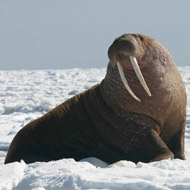
Elephant-only ban could put other animals at greater risk of poaching
The government has announced a consultation on extending the UK Ivory Bill to protect walruses, hippos and narwhals.
The Ivory Bill was announced earlier this year as part of plans to protect elephants. However, concerns have been raised that by focusing on elephants, the Bill might put other animals at greater risk of poaching.
Environment secretary Michael Gove said: “Our ivory ban is one of the toughest in the world and will provide vital protection for the African and Asian elephant from the scourge of illegal poaching. But there are many more precious species, like the hippo and walrus, which could fall victim to the callous trade in ivory.
“The Government will therefore consult on extending the ivory ban to other ivory-bearing animals. We are determined to end this insidious trade and make sure ivory from any animal is never seen as a commodity for financial gain or a status symbol.”
The government has also announced an amendment to the bill to ensure that ivory from all animals could be banned, not just those covered by the Convention on International Trade in Endangered Species of Wild Fauna and Flora (CITES). This would enable to ban to be extended to ivory from warthogs or mammoths, for example, if a case for their inclusion was made during consultation.
Defra Minister David Rutley said: “We have today announced that we intend to consult on extending the ban to include other ivory species and will seek to start the consultation process and gather evidence as soon as practicable after Royal Assent.
“This process will ensure that if we do extend the scope of the ban, this will be robust, defensible, enforceable and compliant with the European Convention on Human Rights. Let me be clear, this will, however, not delay the introduction of the ban on dealings in elephant ivory.”
Walruses and hippos are listed as 'vulnerable' on the IUCN Red List of Threatened Species. Concerns have been raised in response to the Government's consultation about the decline of hippos in particular and the part played by poaching.
The IUCN estimates that the hippo population fell by as much as 12 per cent between 2008 and 2017.



 The RCVS has announced a new version of its 1CPD mobile app, with enhanced features for veterinary surgeons and veterinary nurses to record their continuing professional development.
The RCVS has announced a new version of its 1CPD mobile app, with enhanced features for veterinary surgeons and veterinary nurses to record their continuing professional development.